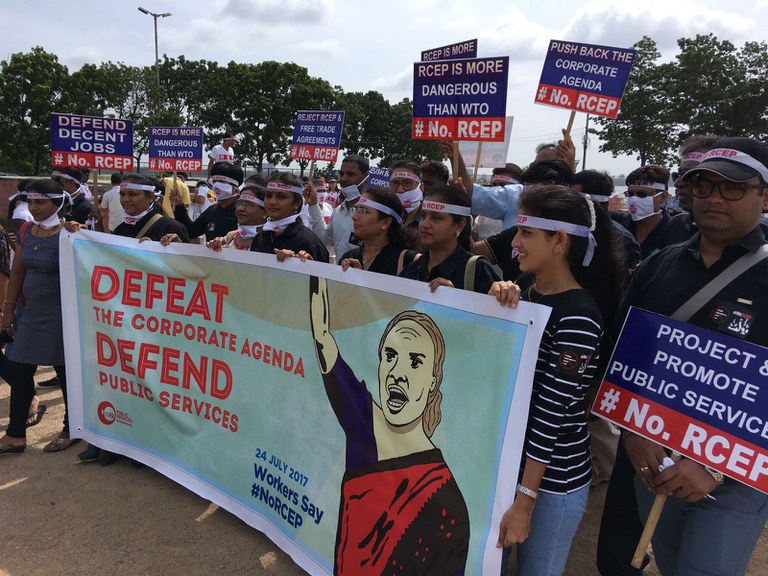Resist RCEP and Its Far-Reaching Impacts on Digital Freedom and Innovation
Statement during the Regional Comprehensive Economic Partnership Stakeholder Engagement, 2017 May 10, PICC Manila, Philippines.

Thank you for recognizing our voice in this round of negotiations around RCEP.
Digital technologies have restructured all aspects of society. It has created breakthroughs in streamlining production, handling trade and finance, and the delivery of social and consumer services. We in digital rights groups, privacy groups, and IT advocates, together with the People Over Profit Network, would like to express our concerns around RCEP provisions affecting the digital sphere, and its potential far-reaching impacts that need to be fully taken into account.
While E-Commerce provisions include Online Consumer Protection and Online Personal Data Protection, we believe that these will be offset by negative impacts created by provisions on Cross-Border Transfer of Electronic Information and the Prohibition on Requirements to Locate Computing Facilities locally. With data now driving a multi-billion industry dominated by a few, easing regulations that protect citizen as well as national data will have serious repercussions for privacy and security on different levels. And with evolving data algorithms predicting all sorts of behavior, we have to ask: is it wise to remove restrictions to data being handed over to digital giants who already are mediating content?
Moreover, lifting restrictions on data localization and cross-border transfers, while preventing governments to see what exactly digital companies are doing with data under the provision on Source Code Disclosure Prohibition, will further create problems in security, safety, and privacy. With the digitization of key sectors like finance, energy and transportation, and even national elections like in the Philippines, governments need the ability to demand transparency and accountability from digital platforms and providers.
Like the TPP, we see problematic RCEP provisions with blanket coverage on copyright that will stifle digital innovation, free speech, and hinder access to socially beneficial technologies. These include copyright terms with no fair use exceptions for access to knowledge and creative works in the public domain, provisions on Electronic Rights Management and enforcement of Technological Control Measures that will hinder experimentation and the development of inter-operable services or products, broadcasting provisions that go beyond TRIPS, and anti-camcording text with no fair use exceptions.
We are concerned that text on the seizure of goods in violation of IPR may include web servers that also host non-infringing content, and urge the removal of retail value which is an inaccurate measure of copyright damage.
Leaks of the IP chapter also contain vague proposals around enforcement in the digital environment that poses serious risks to privacy and freedom of expression.
One of the key outcomes of the ASEAN ICT Masterplan is to address new and emerging digital and information divides. We feel that RCEP’s foray into the digital domain may worsen the digital divide as provisions to protect IPR and push trade liberalization in the telecommunications and digital sectors are inconsistent with reducing access costs to digital services and equipment.
We strongly advise against trade agreements on digital technologies with impacts extending both space and time. If such agreements are put on the table, we urge governments to put a bigger premium on privacy, freedom of information and innovation, and lowering access costs to telecommunications over trade considerations.
Given this context, we hope all ASEAN member country representatives can stand with us to stop RCEP.
Thank you.
Further reading on RCEP: http://www.bilaterals.org/rcep